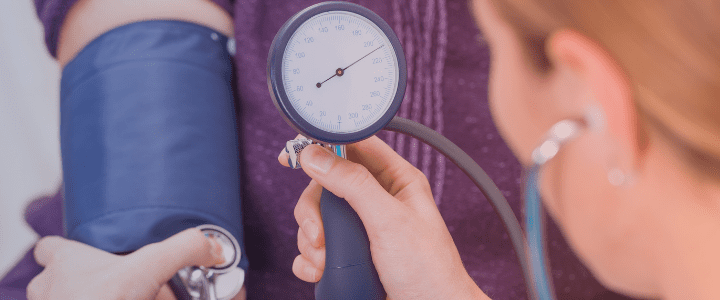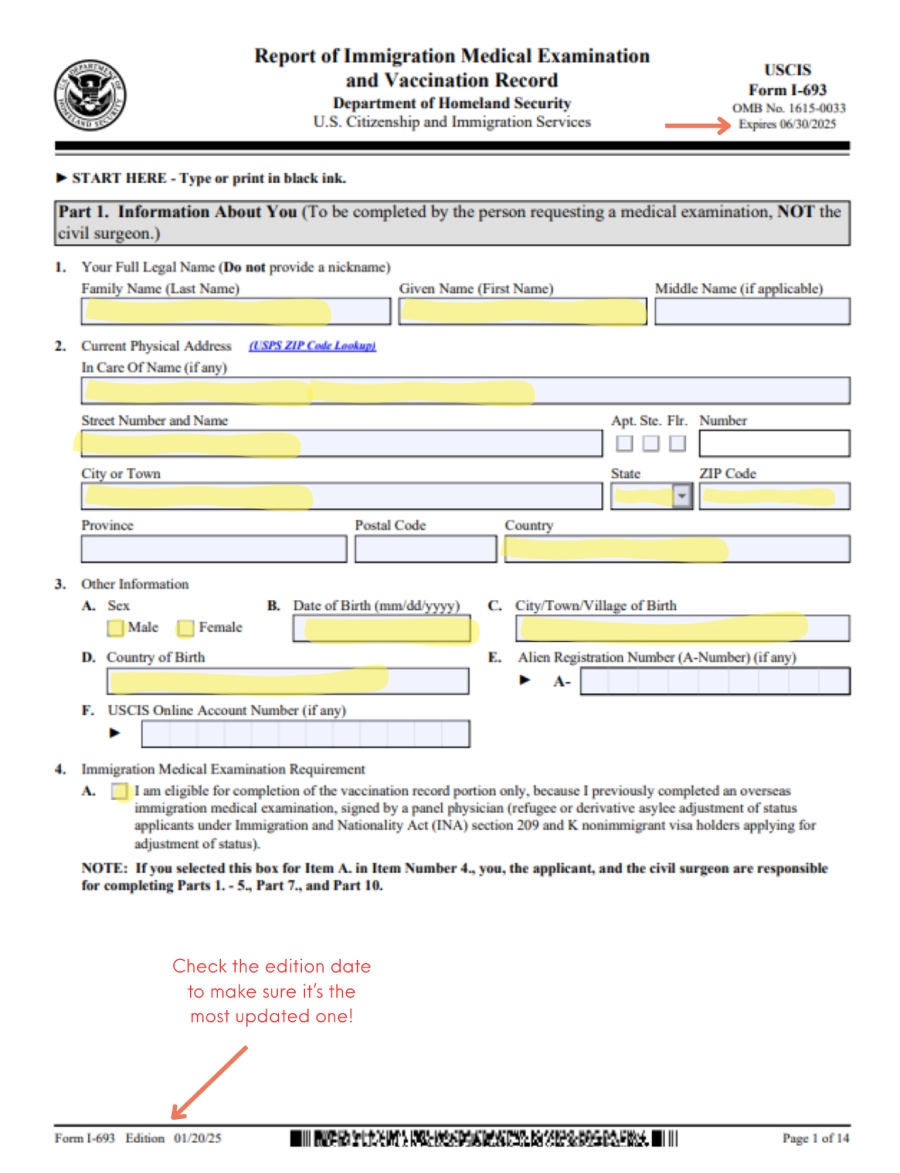USCIS requires all immigrants who are applying for green cards in the U.S. or from abroad to attend a medical exam. There are specific protocols and regulations for a USCIS medical exam. Learn everything you need to know about the exam in our complete guide.
The medical exam is a key part of the immigration process.
Schedule a consultation with a VisaNation attorney to resolve any questions or concerns.
What is an Immigration Medical Exam?
An immigration medical exam is a required health screening to ensure that the applicant is not “inadmissible” to the United States based on public health grounds. In other words, an approved physician will check:
- for certain illnesses
- you’ve had the right vaccines
- you’re not a public health risk.
Depending on where you are filing your application, your green card process will fall under Consular Processing or Adjustment of Status (AOS). Both require a medical exam to confirm you meet the U.S. public health standards.
You can expect the following with an immigration medical exam:
- A physical, mental, and cognitive evaluation
- Drug and alcohol screening
- Review of your medical history and vaccine/immunization records
- Tests for specific diseases and illnesses
- Tuberculosis (TB) Testing
- Blood and Urine Tests
After the exam, for those applying within the U.S., the doctor will seal your Form I-693 in an envelope, and you must NOT open it. If you are applying abroad, the results may be submitted directly to the consulate or embassy electronically.
Green Card Medical Exam Overview
|
Questions |
Inside the U.S. |
Outside the U.S. |
|
What to bring to the medical exam? |
• Gov. issued photo ID • Full medical history • Vaccine records • Previous copies of chest X-rays • A letter from a physician with a treatment plan for any ongoing conditions • Payment for medical exam • Health insurance cards |
Varies according to each embassy/consulate. Typically required to bring: • Visa interview letter; • DS-260 confirmation page • valid passport; • Copy of your immunization /vaccine records • Payment for your medical exam • Health insurance cards if applicable |
|
Cost of Medical Exam |
Rates vary. $250 - $400 USD |
Rates vary. $150 - $500 USD. |
|
Duration of the Exam |
1-2 hours |
2 hours |
|
Tests to be performed |
• Physical examination • Vaccination Review & Administration • Tuberculosis (TB) Testing • Blood & Urine Tests • Mental & Cognitive Assessment |
• Medical history review • Physical examination • Chest X-ray • Blood tests for syphilis. • Tuberculosis (TB) testing • Examination of the eyes, ears, nose and throat, extremities, heart, lungs, abdomen, lymph nodes and skin. |
|
When should I schedule? |
Before you file your I-485 (Adjustment of Status) |
When the National Visa Center (NVC) advises you |
|
How to book appointment? |
Schedule an appointment with a USCIS-designated civil surgeon |
Embassy/Consulate will provide information. |
|
How long are the exam results valid for? |
Two years from the date of the civil surgeon’s signature. |
Determined by embassy/consulate |
How to Book an Immigration Medical Exam
The medical exam is a required step for all green card applicants. Before booking your medical exam, you need to identify which category you fall under:
- Inside the U.S. (Adjustment of Status): You will attend a medical exam with an approved USCIS civil surgeon and submit Form I-693
- Outside the U.S. (Consular Processing): You will attend a medical exam with an approved Department of State panel physician in your home country. Skip to this section.
I-693 Medical Exam: Inside The United States
For those undergoing adjustment of status from within the U.S., you must have your immigration medical exam with a USCIS-designated civil surgeon. Exam results will be recorded on the Report of Medical Examination and Vaccination Record (Form I-693).
Step 1: Schedule an Appointment
Schedule an appointment with a USCIS-designated civil surgeon for your medical examination using the “Find a Civil Surgeon” webpage. The Center for Disease Control and Prevention (CDC) has issued technical instructions for these examinations. Civil Surgeons use these instructions to examine immigration applicants.
Step 2: Bring Required Documentation
Bring the required documents to your appointment, including:
- Form I-693, Report of Medical Examination
- Government-issued photo identification, such as a valid passport or driver’s license. Possible forms of identification include your birth certificate (with an English translation) or an affidavit.
- Vaccination or immunization record showing the required vaccines.
- Health insurance card. Ask the civil surgeon if they accept your medical plan for immigration medical examinations. Many health insurance plans do not cover all portions of this examination.
- Payment (check with the civil surgeon’s office about acceptable forms of payment). USCIS recommends calling multiple civil surgeons to explore costs, as prices can vary by several hundred dollars.
Step 3: Prepare Form
Before your appointment, you need to fill out Part 1 of Form I-693, which is “Information About You”. Do not sign the form yet; you will be instructed to sign it in the presence of the civil surgeon.
Step 4: Attend Exam
The purpose of the medical exam is to establish that you are not inadmissible to the United States on health-related grounds. You can expect the following in your medical exam:
- Identity Verification: The civil surgeon will verify your identity using the government-issued photo identification you provide.
- Medical Evaluation: The examination involves several components to check for specific health-related grounds of inadmissibility:
- Communicable Diseases: You will be tested for tuberculosis, syphilis, and gonorrhea. The civil surgeon will also evaluate you for other sexually transmitted diseases and Hansen’s disease (leprosy). All applicants aged two and older must undergo an initial screening test for tuberculosis.
- Physical or Mental Disorders: The civil surgeon will ask questions to determine if you have a physical or mental disorder with associated harmful behavior. A diagnosis alone does not make you inadmissible; it must be linked to current or likely to result in harmful behavior.
- Drug Abuse or Addiction: The civil surgeon will review your medical history and ask questions to determine any current or past use of controlled substances.
- Vaccination Assessment: The civil surgeon will review your vaccination records to ensure you have received all required vaccinations. If you are missing any, the civil surgeon can administer them, or you can get them from your family doctor and provide the records to the civil surgeon
- Referrals: If necessary, the civil surgeon may refer you to a specialist for further evaluation, such as to a local health department if a chest X-ray suggests tuberculosis. You must complete all required follow-up before the civil surgeon can certify your Form I-693
Step 5: After the Medical Exam
You will sign Part 2 of the form in the civil surgeon’s presence. The civil surgeon will complete Form I-693 and seal it in an envelope for USCIS. The front of the envelope will be marked “DO NOT OPEN. FOR USCIS USE ONLY.”
However, the civil surgeon should provide you with a copy of the completed Form I-693 for your records. The vaccination record portion can be used for other purposes, such as school or employment.
Once you have submitted your application, USCIS will decide on your adjustment of status application.
If the USCIS determines that your I-693 is deficient, opened, or altered in any way, USCIS will return the form to you, so do not accept Form I-693 unless it is in a sealed envelope.
If there are no grounds for inadmissibility, the application should be approved
Key Form I-693 information
Any Form I-693 submitted to USCIS must meet the following requirements:
- The form must be legible.
- All required parts of the form must be complete, except those not needed by the civil physician.
- The designated doctor who conducted the medical examination must sign and date the form.
- The examined applicant must sign and date the form.
- If the applicant requires further diagnosis or testing, the physician(s) completing referral evaluations must sign and date the evaluation.
- The form must still be valid for filing.
- The form must be in a sealed envelope as detailed in the form’s instructions.
If the above requirements are not met, or if there is evidence that the envelope has been tampered with, USCIS will return the original form to the applicant for corrective action.
Panel Physician: Outside the United States
For applicants abroad, your U.S. embassy or consulate will provide you with a list of certified Department of State panel physicians with whom you can book a medical exam.
Step 1: Follow NVC Instructions
Wait for instructions from the National Visa Center (NVC), which will outline the steps to take regarding booking the medical examination. The National Visa Center (NVC) typically sends instructions via the Consular Electronic Application Center (CEAC) and/or email.
Step 2: Book Medical Exam
Find a Panel Physician associated with the U.S Department of State (DOS). The medical exam must be completed before your visa interview.
Step 3: Bring Required Documentation
Each embassy/consulate has its unique instructions for what documents you need to bring. Documents may include:
- Passport-sized color photographs
- Your visa interview letter
- Your DS-260 confirmation page
- Your valid passport
- A copy of your immunization records, including COVID-19 vaccines
- A completed medical questionnaire
- All medical and specialist reports relating to the diagnosis and treatment of tuberculosis (TB)
Step 4: Results and Interview
The physician will submit the exam results directly to the consulate or give them to you in a sealed envelope. With this step finished, you can move on to your green card visa interview.
Immigration Medical Examination Fees
The cost for an immigration medical exam typically ranges from $150 to $500. Importantly, if you need follow-up tests or a vaccine, this has an additional cost.
For those undergoing consular processing, the U.S. department of state has links to each embassy/consulate, which frequently list fees. Find out how much your medical exam costs.
Within the U.S., USCIS does not regulate the medical fee. It depends on the doctor or institution conducting the medical examination. You need to check with the approved physician or the medical facility for current rates.
Preparing for Your Immigration Medical Exam
To avoid delays in your green card application, it is important to come to your medical exam fully prepared. Missing documents or incomplete vaccination records may result in follow-up visits with the doctor or even a Request for Evidence (RFE) from USCIS.
Consult with one of our attorneys to ensure that you have all the necessary documents for your medical examination.
Ensure your vaccinations are up-to-date
Vaccination is an important part of the medical examination that an applicant filing for a green card must satisfy.
United States immigration laws require vaccinations to prevent communicable diseases. The Department of State lists the following:
- Hepatitis A
- Hepatitis B
- Influenza
- Influenza type b (Hib)
- Measles
- Meningococcal
- Mumps
- Pneumococcal
- Pertussis
- Polio
- Rotavirus
- Rubella
- Tetanus and diphtheria toxoids
- Varicella
A physician determines which vaccinations are medically appropriate for an applicant based on their age and vaccine history. A physician also assesses for “contraindications” and medical history, which allows them to identify when a vaccine is “medically inappropriate” for a person, such as in the case of an allergic reaction.
If you are missing any of the required vaccines, the civil surgeon or panel physician may administer them during your appointment. The CDC publishes technical instructions for civil doctors.
These instructions outline how to handle various requirements and scenarios on a case-by-case basis. Additionally, the doctor will note any other relevant points and record objections to receiving vaccinations. Finally, the doctor’s medical report will mention these observations and facts.
What Documents to Bring to the Green Card Medical Exam?
Having the correct paperwork ensures that your medical exam runs smoothly. Be sure to bring:
- Government-issued photo ID to verify your identity
- Copy of full medical history
- Vaccination and immunization records
- Previous copies of chest X-rays
- A letter from a physician with a treatment plan for any ongoing conditions
- Payment for your medical exam. Fees may vary across different USCIS jurisdictions and geographic locations
- Health insurance cards
When Do I Need to Complete the Medical Exam?
If you are completing the initial I-485 application filing, you will need to submit the medical exam with the Adjustment of Status filing concurrently.
If you are applying outside the U.S. via consular process, you will complete the medical exam once the National Visa Center (NVC) advises you to do so. This must be done before your immigration interview.
How Long is the Immigration Medical Exam Valid?
For adjustment of status applicants, a completed Form I-693 is valid for two years from the date the civil surgeon signs it, according to the form instructions
For consular cases, the medical exam validity period is determined by the U.S. embassy or consulate’s guidelines.
Referrals by the Civil Doctor
The USCIS-designated civil doctor may require further testing and assessment. This can happen during your medical examination. This happens when they feel that they need to conduct further evaluation or treatment. The doctor will specify the type of examination and which additional tests or treatments you should undergo.
The I-693 is not signed or dated by the doctor until the applicant has met all health-related follow-up requirements.
Medical Conditions and Inadmissibility
The USCIS, the Department of Health, and the CDC provide up-to-date information to civil surgeons and panel physicians on what constitutes medical inadmissibility.
Class-A medical conditions that render an applicant inadmissible on health-related grounds include:
- Communicable diseases of public health significance
- For permanent resident applications, a failure to show proof of required vaccinations
- Physical or mental disorders that result or are likely to result in harmful behavior
- Substance abuse and substance abuse-related physical or mental disorders
Class-B conditions are physical or mental conditions, diseases, or disabilities. They must be serious in degree or permanent in nature to qualify as Class-B conditions. An applicant in this category of medical conditions does not become inadmissible. However, the medical condition may be relevant to other grounds of inadmissibility.
Medical Exam Validity for K or V Visa Holders Adjusting Status
If you have come into the United States and have completed a medical examination before your arrival, then generally, there will be no requirement to redo the medical exam, provided the following hold true:
- The applicant files for Form I-485 within one year of an overseas medical examination; and
- The panel physician did not find a Class-A medical condition during the overseas examination, or
- The panel physician did find a Class-A medical condition, and the applicant received a waiver of inadmissibility and has complied with the terms and conditions of the waiver.
Proof of compliance with vaccination requirements is necessary even if a new medical examination is not required. If this is not provided, the doctor will complete the vaccination assessment part of Form I-693.
Refugees Applying for Adjustment
All refugees must comply with the vaccination requirements at the time of adjustment of status. They do this by submitting the relevant parts of the Report of Medical Examination and Vaccination Record (Form I-693) completed by the designated physician.
In cases of overseas consular processing, medical exams are usually completed beforehand. As such, it does not need to be redone. However, if the panel physician discovers a Class-A medical condition, things change. You must repeat the entire examination if you have a Class-A medical condition.
Family members who want to adjust their status and have refugee status in the United States must also undergo a medical examination.
A civil doctor who is handling the medical examination may require further tests. Situations in which a medical exam has already been previously completed are also included. They can also order vaccinations to cover the requirements of undergoing a medical examination.
Asylees Applying for Adjustment
Any asylee to the United States must undergo an immigration medical exam. This includes a vaccination assessment at the time of filing for an adjustment of status. However, under certain circumstances, you may not have to repeat an exam. For example, this applies if your medical examination took place overseas and:
- The results of the overseas medical examination in the A-file did not report a Class-A condition;
- The asylee has applied for an adjustment of status within one year of eligibility to file; and
- Specific evidence in the A-file or testimony given at the interview that there is no evidence that the asylee acquired a Class-A condition after they entered into the United States.
*A-Files contain all records of any active case of an alien not yet naturalized. This applies to them as they pass through the U.S. immigration and inspection process.
You must establish compliance with the vaccination requirements. The applicant must submit the vaccination assessment with the adjustment of status application. In addition, the applicant must have the relevant parts of Form I-693 completed by a civil doctor to comply with the requirement.
Immigration Medical Exam: FAQs
Who is required to get the immigration medical exam?
Anyone applying for a green card must take the immigration medical exam.
Will children need to take a medical exam?
Yes, children need to take a medical exam. However, the vaccine requirements will depend on the child's age.
What kind of doctor do I have to see?
If you are in the United States and applying, you need to have a civil surgeon perform the medical exam. USCIS determines these civil surgeons. If you are overseas and applying, you need to see a panel physician authorized by the United States Department of State (DHS).
How much does the medical exam cost?
Prices for the medical exam can vary anywhere from $250-$400.
What items do I bring with me to the exam?
When you go to your medical exam, bring with you:
- Vaccination or immunization records
- Copies of your medical history, including chest x-rays, if applicable
- Government-issued ID (passport, driver's license, travel permit, etc.)
- A letter from your doctor if you are receiving any current treatment
- Funds/Health insurance card, if the doctor accepts your insurance
- Form I-693, Report of Medical Examination and Vaccination Record (if applying in the U.S.)
- Green Card Interview appointment letter from the NVC if you are applying overseas
How do I schedule an appointment with the doctor?
The easiest way is to use this USCIS tool to find a doctor authorized by U.S. Citizenship and Immigration Services.
Contact the doctor of your choice and ask them to schedule a medical examination for your immigration case.
If you need to schedule the medical exam from overseas, you can do so only after receiving your green card interview appointment letter from the National Visa Center. Do not try to complete the exam before you are notified of your green card interview date. You can locate an authorized doctor for the exam by contacting the U.S. Embassy or consulate in your area.
How long does the medical exam take?
The time for the medical exam can vary depending on the facility, however, you should expect to spend around 1-2 hours.
What happens after the medical exam?
Typically, the physician will seal the medical exam results in an envelope and hand it over to you (the immigration applicant). In certain countries, the physician will send it directly to the embassy.
What if an applicant has a learning or intellectual disability?
Immigration applicants with any intellectual or learning disabilities will need to provide a report for their condition. They will also have to provide any special supervision or educational requirements for the exam.
What if I am missing some of the required vaccines?
If you are not able to locate records for previous vaccinations, the physician will work with you and determine if any vaccinations are needed based on your age and blood test.
What if an applicant has an abnormal chest X-ray?
Applicants who have ever had an abnormal chest X-ray must bring the last X-ray films they took and bring them to the designated physician for the immigration medical exam. The physician may need the actual films (not the typed reports) to compare with the applicant's X-rays at the immigration medical exam.
What if an applicant has a history of violent behavior or a psychiatric condition?
If an applicant had any history of violent or harmful behavior, resulting in injury or harm to people, animals, or inanimate objects, they would have to provide a report that would help the physician determine if the behavior was related to a medical or psychiatric issue, or drug or alcohol use.
If you had been hospitalized or treated for a mental or psychiatric condition or substance abuse, you must present a written certification detailing the diagnosis, duration of treatment, including prognosis.
Can the immigration medical exam and/or vaccinations be waived?
Generally, the medical exam is required for most visa categories. However, if there is a medical reason for you not to have completed any vaccination out of the required vaccinations for your visa application, certain waivers can be granted upon the recommendation of the civil physician.
My priority date is soon-to-be current. Should I prepare for my medical exams?
If you are an I-485 applicant and have a priority date that will most likely be current soon, then you should prepare for the medical exam.
When does the medical exam expire?
If Form I-693 is signed by a civil surgeon on or after Nov. 1, 2023, it is only valid while the green card application is pending.
Will pregnant women need X-rays?
Yes, but applicants who are pregnant may postpone the required immigration chest x-ray (and immigration medical examination) until after pregnancy. Pregnant applicants should discuss this matter with the Department of State (DOS) consular officer to determine if the delay will affect their immigration status.
Who is required to get the immigration medical exam?
Anyone applying for a green card must take the immigration medical exam.
Will children need to take a medical exam?
Yes, children need to take a medical exam. However, the vaccine requirements will depend on the child's age.
What kind of doctor do I have to see?
If you are in the United States and applying, you need to have a civil surgeon perform the medical exam. USCIS determines these civil surgeons. If you are overseas and applying, you need to see a panel physician authorized by the United States Department of State (DHS).
How much does the medical exam cost?
Prices for the medical exam can vary anywhere from $250-$400.
What items do I bring with me to the exam?
When you go to your medical exam, bring with you:
- Vaccination or immunization records
- Copies of your medical history, including chest x-rays, if applicable
- Government-issued ID (passport, driver's license, travel permit, etc.)
- A letter from your doctor if you are receiving any current treatment
- Funds/Health insurance card, if the doctor accepts your insurance
- Form I-693, Report of Medical Examination and Vaccination Record (if applying in the U.S.)
- Green Card Interview appointment letter from the NVC if you are applying overseas
How do I schedule an appointment with the doctor?
The easiest way is to use this USCIS tool to find a doctor authorized by U.S. Citizenship and Immigration Services.
Contact the doctor of your choice and ask them to schedule a medical examination for your immigration case.
If you need to schedule the medical exam from overseas, you can do so only after receiving your green card interview appointment letter from the National Visa Center. Do not try to complete the exam before you are notified of your green card interview date. You can locate an authorized doctor for the exam by contacting the U.S. Embassy or consulate in your area.
How long does the medical exam take?
The time for the medical exam can vary depending on the facility, however, you should expect to spend around 1-2 hours.
What happens after the medical exam?
Typically, the physician will seal the medical exam results in an envelope and hand it over to you (the immigration applicant). In certain countries, the physician will send it directly to the embassy.
What if an applicant has a learning or intellectual disability?
Immigration applicants with any intellectual or learning disabilities will need to provide a report for their condition. They will also have to provide any special supervision or educational requirements for the exam.
What if I am missing some of the required vaccines?
If you are not able to locate records for previous vaccinations, the physician will work with you and determine if any vaccinations are needed based on your age and blood test.
What if an applicant has an abnormal chest X-ray?
Applicants who have ever had an abnormal chest X-ray must bring the last X-ray films they took and bring them to the designated physician for the immigration medical exam. The physician may need the actual films (not the typed reports) to compare with the applicant's X-rays at the immigration medical exam.
What if an applicant has a history of violent behavior or a psychiatric condition?
If an applicant had any history of violent or harmful behavior, resulting in injury or harm to people, animals, or inanimate objects, they would have to provide a report that would help the physician determine if the behavior was related to a medical or psychiatric issue, or drug or alcohol use.
If you had been hospitalized or treated for a mental or psychiatric condition or substance abuse, you must present a written certification detailing the diagnosis, duration of treatment, including prognosis.
Can the immigration medical exam and/or vaccinations be waived?
Generally, the medical exam is required for most visa categories. However, if there is a medical reason for you not to have completed any vaccination out of the required vaccinations for your visa application, certain waivers can be granted upon the recommendation of the civil physician.
My priority date is soon-to-be current. Should I prepare for my medical exams?
If you are an I-485 applicant and have a priority date that will most likely be current soon, then you should prepare for the medical exam.
When does the medical exam expire?
If Form I-693 is signed by a civil surgeon on or after Nov. 1, 2023, it is only valid while the green card application is pending.
Will pregnant women need X-rays?
Yes, but applicants who are pregnant may postpone the required immigration chest x-ray (and immigration medical examination) until after pregnancy. Pregnant applicants should discuss this matter with the Department of State (DOS) consular officer to determine if the delay will affect their immigration status.














